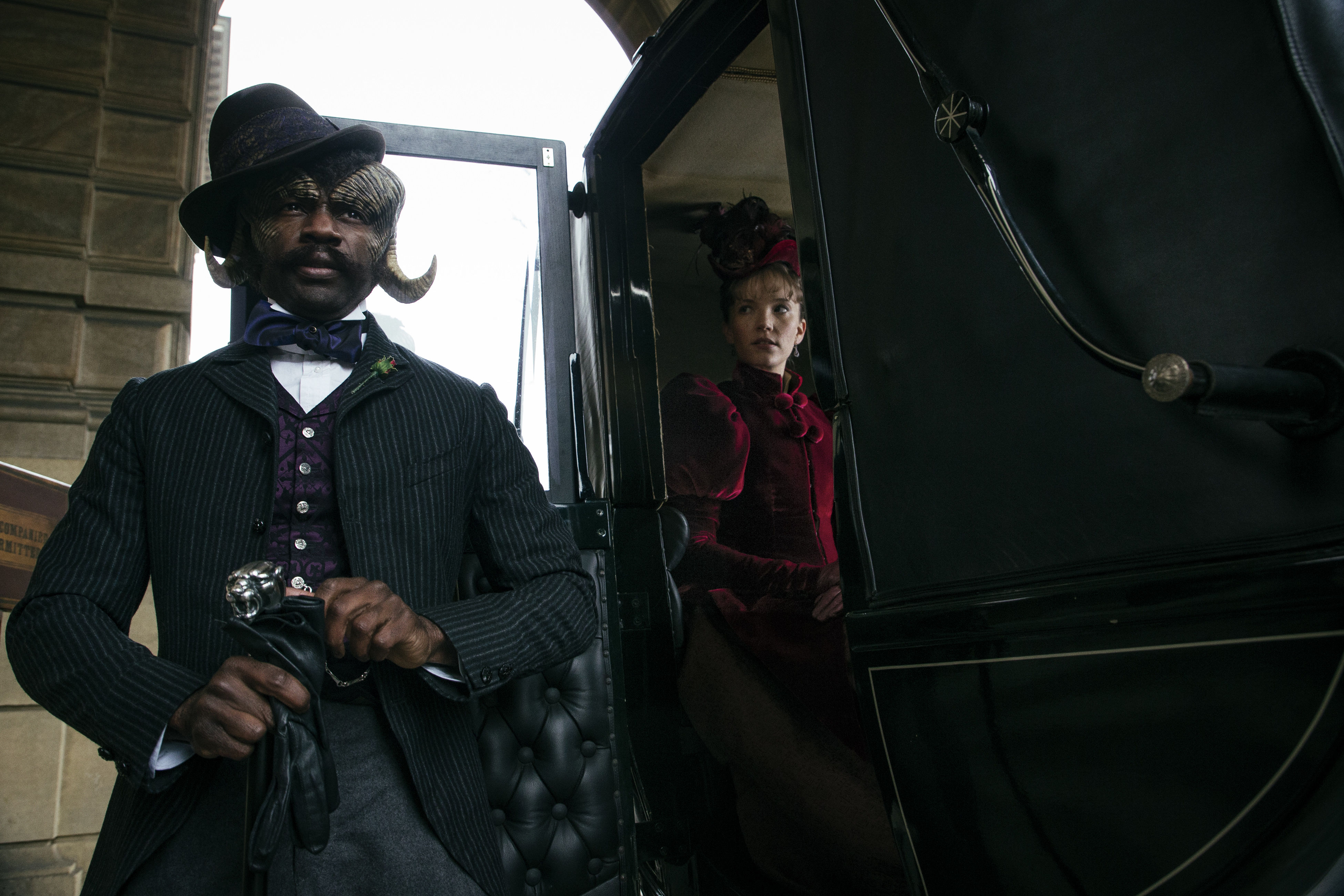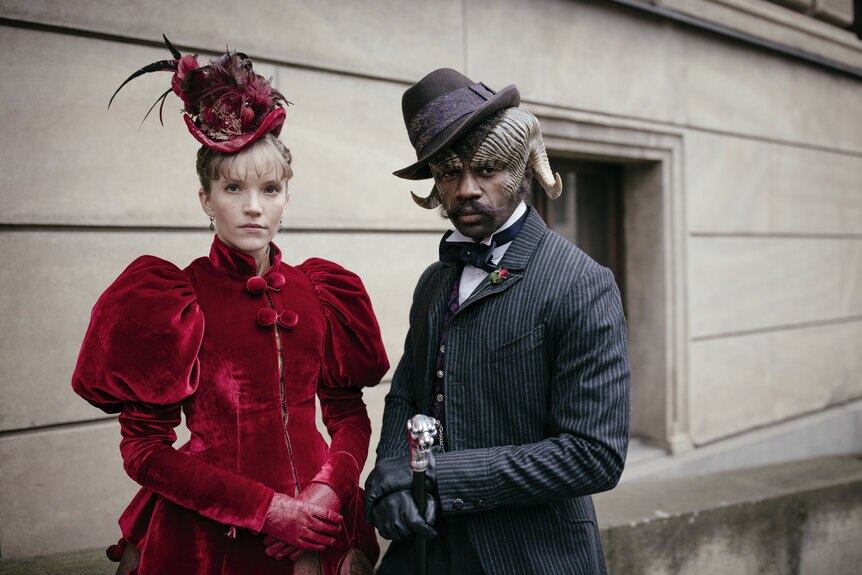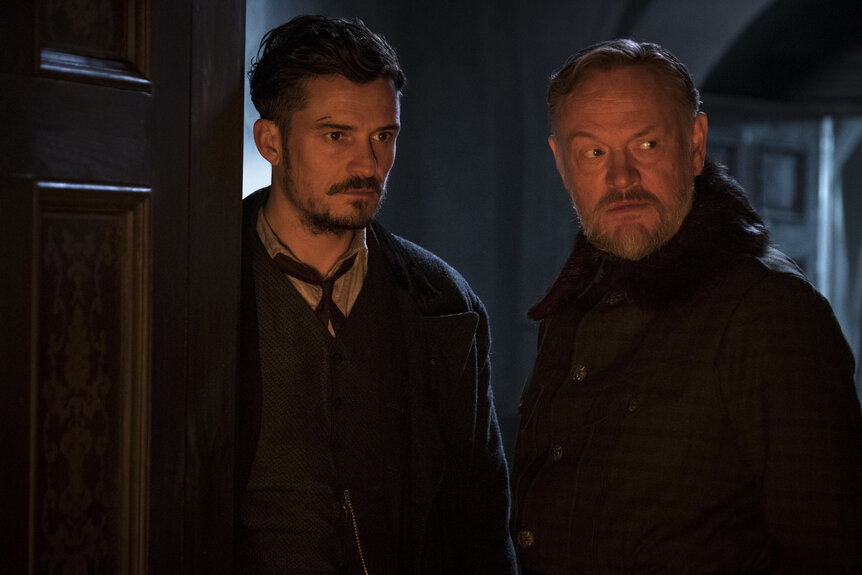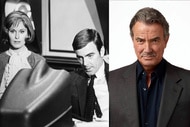Create a free profile to get unlimited access to exclusive videos, sweepstakes, and more!
Carnival Row is a morality story with MAGA-type slavers and fairy victims

On the surface, Carnival Row is a fairly straightforward dark fantasy. You have Orlando Bloom's Rycroft Philostrate, a human detective with a mysterious past in a world where fantasy creatures like fairies and centaurs are real. He's hot on the trail of a brutal killer, essentially a Jack the Ripper for fantasy creatures, when the past he thought he let go of literally comes flying back into his life in the form of Cara Delevingne's Vignette Stonemoss, a battle-hardened fairy who ends up in servitude in the land of humans.
But beneath the surface, there is all sorts of political commentary going on. It was filmed in 2017, shortly after the 2016 "Make America Great Again" presidential election, and there's a sadly relevant examination of xenophobia as the humans both exploit and resent the fantasy creatures seeking asylum from certain death in their country. Beneath that is another story that focuses on a snobby aristocratic brother and sister, Imogen (Tamzin Merchant) and Ezra Spurnrose (Andrew Gower), whose world is turned upside down when a wealthy centaur, Agreus Astrayon (David Gyasi), moves in next door.
It's no coincidence series creator Travis Beacham and his team cast the Spurnrose siblings with white actors and the centaur Agreus with a black actor.
"When you're pitching a show, the question you're always asked is 'Why now?'," actor Jared Harris — who plays a politician who campaigns for Fae rights while still exploiting them — told SYFY WIRE when asked about the politics beneath the fantasy. "Why this show right now? The precedent that the show is based on is the European exploitation of the New World, and the fantastical creatures are really the Native American tribes who are being manipulated by the French and the Germans and the English and the Spanish. That's actually the blueprint that Travis was working on. It's just sad that it's relevant again now."
Carnival Row is an examination of human nature in a way that can only be done in genre (see The Dark Crystal: Age of Resistance for something similar). There's something about telling a politically charged story within a fantasy world that makes it more palatable. Merchant (Imogen Spurnrose) had an idea as to why that is.
"What it is about genre is you get to see our own world in a different way," Merchant says. "I'm a Gryffindor, for example. I hope people, if they're a Brexiteer or a Build the Wall kind of person, are like, 'I'm a Fae, I'm a Puck,' and then they'll be like 'Hang on a second ...'"
Gyasi (Agreus Astrayon) was quick to make it clear that while this show certainly has a progressive bent, nobody is exactly clean or morally righteous on Carnival Row.
"In the interest of balance, I am not on the Build the Wall/Brexit side, but as I look at Carnival Row, I'm interested in looking at a character that represents another side, that actually gets me to think about that side," he says. "I think Indira Varma's character (Piety Breakspear) is very interesting. Here you have someone who is like, 'I must protect what I have.' No matter what side you're on, that's what we're trying to do. I'm trying to make sure my family is going to be okay. I'm trying to make sure my kids are going to be okay. That's something that everyone can relate to.
"Whether you find it attractive or not, there's something about that need to protect yourself and your family that resonates, whatever side of the coin we're on," he continues. "When we start to think about the things that actually resonate with all of us and connect with all of us and focus on those for a minute, maybe something good could happen. I'd hate for it to come across that this show is just pumping out one sort of narrative."
Character complexity comes hand in hand with long-form storytelling. You just have more time to invest in a character when you're telling a story over eight hours. For the actors involved with Carnival Row, that meant there was always a chance for discovery, especially because they didn't have all the scripts for all the episodes at the very beginning. In fact, it wasn't until about the middle of shooting that they knew where their characters would end up at the conclusion of Season 1.
That provided a rather surprising moment for Gyasi. His character, Agreus, is a rarity in this world. He's a wealthy Fae and very interested in adapting to human society. In fact, he even shares a lot of the more prejudiced views his rich human neighbors harbor. Gyasi was surprised to find out his character built his wealth as a skipjack, a person who ferried "Critch" (Fae) across the channel and into slavery.
"In my head, I likened this guy to a pioneer," Gyasi explains. "If I was to relate it to our world, he'd be a Malcolm X or a Martin Luther King. All of a sudden, I found out this guy captured his own kind and sold them back to the oppressor and that's how he made his money. It hurt so much that I called a meeting with Travis and Rene [Echevarria, producer].
"They were like, 'Dude, you have to think in this world that we've created where this hierarchy exists ... you tell us, how do you get from this level to that level? How is that possible?'" he says. "It flummoxed me. That makes him infinitely more interesting. That gives him so many more layers. He went from someone who I really respected and loved putting on the clothes to a period when we were filming where I hated putting on the clothes and putting on the costume."
Andrew Gower plays Ezra Spurnrose, Imogen's screw-up brother, who is squandering the family's wealth and carries quite a lot of hatred for Fae, especially one who would dare move in next door. But the realization that Agreus was a slaver was an important moment for the character, who is investing in exactly the same profession. Gower says that moment puts the two men on exactly the same page, which is something he never would have imagined in his wildest dreams.
"Beneath everything the fundamental emotion that he's feeling is the fear of the other," Gower says. "He's covering himself with a comfort blanket and keeping himself in his own circle. The beauty of this show is that, with sci-fi and fantasy, watching something like this could spark those conversations. Why do we, as humankind, still go back to the same point? There's always a scapegoat in society, there's always somebody targeted and this fear of difference. That's what it boils down to for me, the fear of difference."
Even the heroes of the show aren't painted in one color by a single brush. For instance, Bloom's character straight-up ghosted the love of his life, making her think he'd died. And he's the good guy!
And then there's Harris' politician, the one who champions the rights of the Fae while at the same time exploiting them for his own financial gain. As you can imagine, he was rather intrigued when I mentioned that his character, Absalom Breakspear, was actually one of the noblest people in the whole show.
"It's interesting to me that you think he's pure, because to me he's the most confused and human character," Harris says.
But his on-screen son, Arty Froushan, backed me up in saying that while Mr. Breakspear is no saint, he's probably the least manipulative character in the show, especially when you consider all the machinations going on by all those around him. He has to deal not only with family turmoil as the legitimacy of his son is called into question and it becomes quite clear that his wife is hiding a lot of things, but also with the political challenge that arrives in the form of Caroline Ford's Sophie Longerbane.
Sophie is a character who is never caught off guard. She spouts lots of anti-Fae hate, but whether she actually believes it or is an anarchist who likes to stir the pot is up for interpretation. That also makes her a rather strong character and one that closely mirrors today's staunchly dug-in political debate.
"She's so in control and strong, which was quite unique and quite exciting to me," Ford says. "Every time I'd go into a scene I'd always think that I knew some terrible secret about everyone I was talking to, so then I'd always have power over every situation. It did make me feel more powerful. It was very fun for me, and I do think it rubbed off on me, not the dark side of her, but the strength of her."
Each character having their own contradictions, positive and negative, only makes them more interesting to play. Harris interjects that playing flawed people caught between the angel on one shoulder and the demon on the other is what he seeks out as a performer.
"They're the most interesting to play, because then you've got some tension," Harris explains. "That's why bad guy scenes tend to be so short. They drop them in and they go, 'Everything's going to plan,' and that's it, move on. Those are the really badly written ones. Characters that are good guy characters are also really boring to play. That's why they say Jesus Christ is a very difficult role to play. It's very hard because he's just good."
There certainly are no Christ-like characters in Carnival Row. Everybody is tainted, characters are as murky as the foggy Victorian-era atmosphere of the show. And that's exactly what should elevate it above your standard fantasy show. Although, in the era of Game of Thrones being the most popular thing in the world, our definition of "standard fantasy show" has certainly become far more complex than it was a generation ago.
















